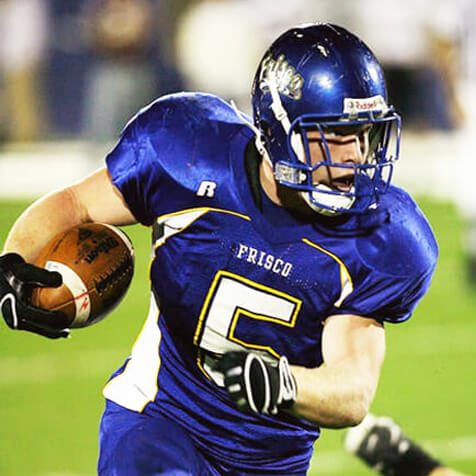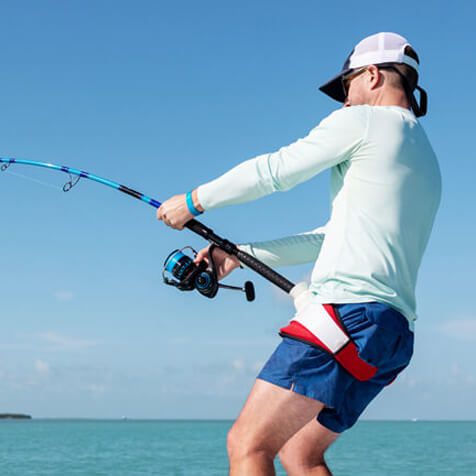Rotator cuff injuries
Treatments for rotator cuff tears and sprains
When your shoulders work how they should, there’s no reason to think twice about them whenever you’re doing everyday activities like reaching for the phone, stretching to grab something, or carrying a heavy box. But, because of the amount of work shoulders do, the risk of experiencing a rotator cuff injury is high.
The Florida Orthopaedic Institute’s shoulder surgeons know full well how inconvenient and frustrating it is when you can’t perform routine tasks because of an injured shoulder.
Our goal is to help you better understand a rotator cuff injury, torn rotator cuff symptoms, and treatment options for rotator cuff tears. With the right care, preparation, and rehabilitation, you can reduce pain, regain strength, and return to the activities you enjoy.
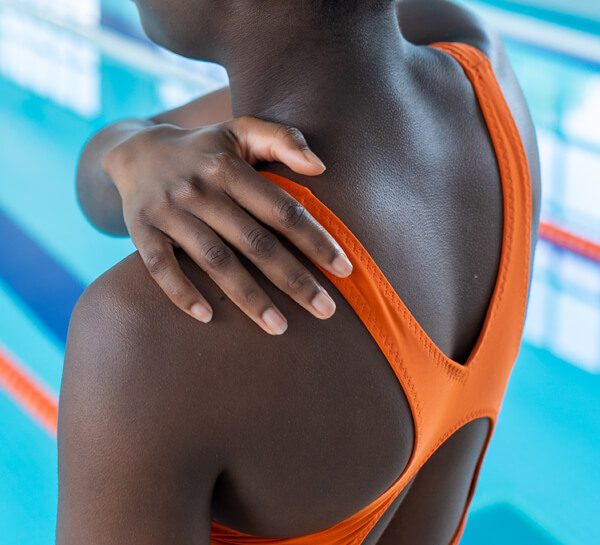
Anatomy
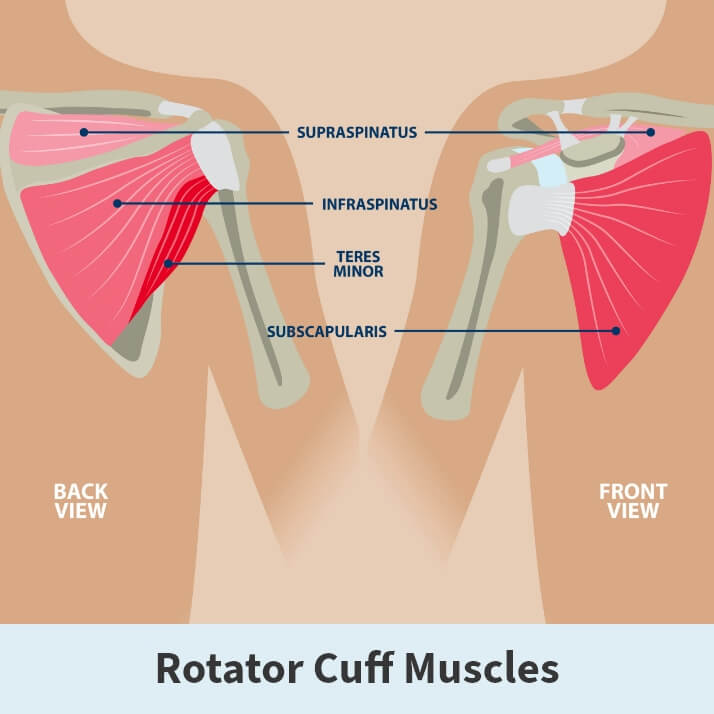
Your shoulder is a remarkably mobile joint that allows your arm to rotate with a range of motion in almost any direction. To achieve this, it works like a ball-and-socket joint, where the ball (the top of your arm bone or humerus) fits into the shallow socket (the shoulder blade or scapula).
Holding all this together is the rotator cuff, a group of four key muscles and tendons keeping your arm bone securely in place while allowing the arm to lift, rotate and move smoothly.
The rotator cuff stabilizes your shoulder, making it essential for almost every movement you do with your arm—from throwing a ball, brushing your teeth or even reaching up into a cabinet. When there’s a rotator cuff injury, whether it’s through daily wear and tear or sudden force trauma, you can experience pain, weakness and reduced mobility and range of motion.
What are rotator cuff tears?
Tendinitis, or partial thickness tears, is the most common injury to the rotator cuff. These rotator cuff injuries occur when the stabilizing tendons or muscles in the shoulder that move the arm become damaged.
Rotator cuff tears are most seen in people who perform repetitive overhead motions, like athletes or those with physically demanding jobs. In fact, almost 2 million people visit a doctor each year because of rotator cuff tear symptoms. These rotator cuff tears are classified into two main categories:
Partial or incomplete rotator cuff tears
A rotator cuff injury is considered a partial or incomplete tear if the tendon is frayed, stretched or has a small tear (also called micro-tearing), but it’s still partially attached to the bone. Even a partially torn rotator cuff can lead to shoulder pain, weakness and difficulty performing certain movements, especially those that involve lifting or rotating the arm.
While a partial rotator cuff tear may not be as severe as a full-thickness tear, it can cause discomfort and worsen over time if left untreated. Partial-thickness tears may increase in size and become full-thickness tears over time
Complete rotator cuff tear (or full-thickness rotator cuff tear)
This type of injury occurs when the rotator cuff tendon completely separates from the bone, often resulting in a significant loss of function in the shoulder. Because the tendon is no longer able to keep the arm bone securely in place within the shoulder joint, those with a complete rotator cuff tear will experience weakness and pain in the shoulder area, as well as difficulty performing everyday tasks like lifting or reaching overhead.
It’s called a full-thickness tear because the tendon is torn all the way through, leaving a gap between the muscle and the bone. This kind of rotator cuff injury typically requires more intensive treatment, and in many cases, rotator cuff tear surgery, to reattach the tendon and restore full shoulder function.
The severity and degree of the rotator cuff injury must be determined to determine the right course of treatment. Whether your shoulder pain is due to a partial or complete tear or a condition like shoulder impingement or bursitis, getting an early diagnosis and starting treatment as soon as possible is vital to preventing further damage—and getting you back to everyday activities.
What causes rotator cuff tears?
Rotator cuff tears commonly develop from normal wear on your shoulder. However, a sudden accident or age-related degeneration over time can also cause a torn rotator cuff. Whether it’s caused by gradual changes associated with aging or orthopedic trauma (caused by a car collision, falling on an outstretched hand or other accident), you may experience rotator cuff injury symptoms.
Understanding the different causes better can help you take steps to try and prevent some from happening and help you know which symptoms are signs to seek diagnosis and treatment.
Acute injuries
Acute rotator cuff injuries are the result of immediate trauma to the shoulder tendons. This can happen if you fall on an outstretched arm, experience some sort of impact during a physical activity or simply attempt lifting something too heavy. These sudden, high-impact events can cause the tendon to tear, leading to immediate pain, weakness and difficulty moving your shoulder.
Chronic deterioration
On the other hand, chronic deterioration happens gradually when the rotator cuff experiences wear and tear from repeated use. This repeated stress can lead to fraying or thinning of the tendons, making them more susceptible to partial or complete rotator cuff tear.
Chronic deterioration is a slow, ongoing process that doesn’t cause noticeable rotator cuff injury symptoms at first but results in pain, weakness and a limited ability to move your shoulder over time.
For example, rotator cuff arthropathy is a type of glenohumeral arthritis, or ball and socket arthritis, caused by a significant tear to the rotator cuff. This tear leads to abnormal joint wear and tear, for which reverse total shoulder replacement surgery is preferred.
Learn more about treatments for arthritis pain
Aging
Chronic deterioration is part of advancing age, which contributes to the further development of complications in the shoulder, like bone spurs—small bone overgrowths that form around the shoulder joint. These spurs rub against the rotator cuff tendons to cause a rotator cuff injury called shoulder impingement, which puts even more pressure on the tendons and makes them more likely to tear.
Also, as we age, the blood supply to the rotator cuff decreases, making it harder for the body to repair minor injuries to the tendons. Approximately 62% of adults over the age of 80 experience a torn rotator cuff, making it one of the most common causes of shoulder disability.
Symptoms and signs of rotator cuff injuries
It shouldn’t be surprising that shoulder pain is the most common and obvious symptom of a rotator cuff tear. It’s estimated that anywhere from 5% to 39% of people will have some degree of rotator cuff tearing, with those over 40 being more susceptible to a rotator cuff injury.
In acute rotator cuff injuries, this pain is felt right after the incident, usually with sharp intensity radiating down the upper arm called the humerus. Pain may also be felt during overhead movements or when lifting objects.
Learn the 12 common causes of upper arm shoulder pain
For injuries caused by gradual deterioration, torn rotator cuff symptoms develop more slowly and can include:
- Worsening pain: Particularly felt during activities like lifting, reaching or participating in sports. Pain at nighttime is very common.
- Progressive weakness: In the shoulder or arm, making it harder to perform tasks that used to be easy.
- Difficulty moving the arm: Motions up or down (especially overhead motions) cause pain and discomfort.
- Challenges with everyday tasks: Pain felt while dressing, combing your hair or reaching behind your back.
A torn rotator cuff injury may not always cause noticeable pain, but most people will still feel a certain level of shoulder or arm weakness, even without discomfort. This weakness and limited mobility can become worse if left untreated.
Recognizing these torn rotator cuff signs early and seeking targeted rotator cuff tear treatment can help prevent more injury to your shoulder and increase your chances of improvement and recovery.
John A., who tore his rotator cuff and bicep muscle and tendon after an accident when preparing his house for hurricane Irma, got back to doing what he loves out on the water with his family, thanks to personalized shoulder care from Florida Orthopaedic Institute.
Watch John A.’s rotator cuff and bicep injury patient story
If you’re experiencing worsening pain or other symptoms associated with a rotator cuff injury, we can help. Request an appointment with an FOI shoulder physician for a proper diagnosis and customized treatment plan.
What happens if you don’t treat a rotator cuff injury?
If a partial rotator cuff tear goes untreated, it can progressively worsen and progress into a complete rotator cuff tear. As a rotator cuff injury deteriorates, the shoulder’s stability and function also decline, which generally leads to increased pain, weakness and difficulty performing everyday tasks. Once a partial tear turns into a full tear, the required treatment becomes more serious, meaning the likelihood of rotator cuff tear surgery and a longer recovery time.
Leaving a rotator cuff tear untreated also increases the risk of injury to other areas of your shoulder or arm, like the biceps tendon, which can become overloaded trying to compensate for the damaged rotator cuff. The surrounding muscles and tissues can also weaken, leading to a more complicated and lengthy recovery process. It can eventually lead to arthritis in the shoulder joint.
Our orthopedic surgeons can’t stress enough how early diagnosis and rotator cuff tear treatment—whether through physical therapy, rest or rotator cuff tear surgery—helps prevent these types of shoulder injuries from going from bad to worse, not to mention improving long-term outcomes.
If you suspect you have a rotator cuff injury, don’t wait to get help. Schedule a consultation with a Florida Orthopaedic Institute shoulder surgeon to avoid complications down the road.
What are the risk factors associated with torn rotator cuff injuries?
Some of the factors that can increase your risk of developing a rotator cuff tear, whether due to sudden injury or gradual wear and tear over time, include:
- Age
- Overhead shoulder use & repetitive motions
- Smoking, high cholesterol & diabetes
Age
As you get older, particularly if you’re over 40, your chances of experiencing a torn rotator cuff increase significantly. This is because the tendons naturally weaken and lose elasticity as part of aging, making them more susceptible to tears.
Overhead shoulder use & repetitive motions
Athletes who use repetitive or winding overhead motions, such as baseball pitchers and tennis players, are at a higher risk of rotator cuff injury due to the constant stress they place on their shoulder joints. These vigorous, repetitive movements can lead to overuse injuries.
Additionally, labor-intensive jobs and hobbies that involve consistent overhead activities, like painting and carpentry, or any work that requires the repeated lifting of your arms above your head, can also put you at a higher risk. Over time, the stress of these motions leads to gradual weakening and tearing of the rotator cuff tendons.
If you do a lot of overhead shoulder tasks, try to be mindful of the strain you’re putting on your shoulders and take preventive steps, such as stretching, strengthening exercises and using proper technique, to help lessen the risk of a rotator cuff injury.
Smoking, high cholesterol & diabetes
Smoking, high cholesterol, and diabetes significantly increase the risk of rotator cuff injuries. Smoking reduces blood flow, depriving shoulder tendons of essential nutrients, making them weaker and more tear-prone.
High cholesterol can clog blood vessels, further limiting blood supply to the tendons and accelerating their wear. Diabetes exacerbates the issue by increasing blood glucose levels, which can stiffen and weaken the tendons. Managing these conditions with lifestyle changes and appropriate medical care can greatly reduce your risk of a rotator cuff injury.
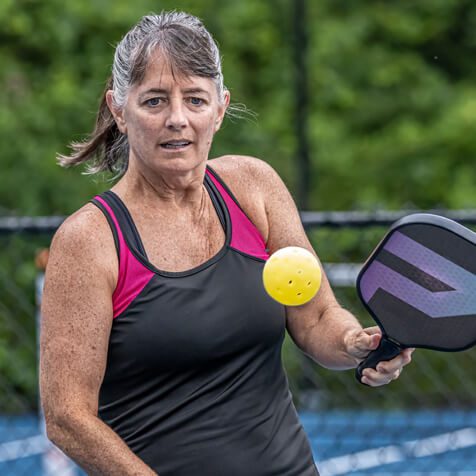
Diagnosing rotator cuff injuries
Florida Orthopaedic Institute doctors will begin diagnosis with a thorough examination of your shoulder. To start, they’ll check for:
- Muscle shape: Any visual or physical signs such as swelling or muscle loss (atrophy) in the shoulder area
- Range of motion: You’ll be asked to move your arm and shoulder in different directions to assess where your mobility is limited
- Strength levels: An evaluation of your strength is performed by asking you to resist or lift your arm against pressure
- X-rays: An X-ray of your shoulder is often performed in the clinic to check for bone spurs, fractures, and other conditions
Your doctor may press on specific spots around your shoulder to pinpoint the most painful or tender areas. This helps gauge your pain threshold and determine the exact location of the rotator cuff injury. Depending on the physical exam results, your doctor might recommend scheduling additional diagnostic imaging tests, such as an MRI (magnetic resonance imaging), ultrasound, or CT (computed tomography).
While orthopedic X-rays help rule out bone issues like fractures or spurs, an MRI provides the clearest image of soft tissues, including the tendons and muscles, so it is essential to confirm the diagnosis of a rotator cuff tear.
How shoulder specialists help
Rotator cuff injuries that are left untreated will progressively become worse. That’s why seeking out a shoulder physician like the ones at Florida Orthopaedic Institute is key in helping to diagnose the problem and guide you through treatment.
FOI’s specialists in treating shoulder pain use advanced diagnostic imaging techniques, like MRIs and ultrasounds, to get a detailed look at your injured rotator cuff and determine if nonsurgical treatment or rotator cuff tear surgery is best for you.
Rotator cuff tear treatment
To determine the best rotator cuff tear treatment for your specific rotator cuff tear, your doctor will start by considering the following factors:
Age
Age plays a big role in rotator cuff injury. According to research studies, when people reach the age of 60, their chance of experiencing a rotator cuff tear is 50%. There are also studies showing that 80% of individuals over 80 experience asymptomatic complete rotator cuff tears.
Along with an increased risk, older adults are also likely to experience larger and more severe tears. This age-related worsening affects healing and also increases the chance of experiencing complications—like re-tears—seen especially in those over 60 years old, where the retear rates range from 31% to 51%.
Fitness level
Your fitness level plays a part in the rotator cuff tear treatment results. Patients with a better baseline fitness level tend to respond more positively to rotator cuff tear surgery and nonsurgical treatments.
General health
Good overall health, including healthy weight and blood pressure, helps prevent unnecessary stress on the shoulder, so the healthier you are overall, the better your body can handle rotator cuff injury and rotator cuff tear treatment.
Being overweight can increase the strain on joints and muscles, making a rotator cuff injury more likely. Research published in the American Journal of Sports Medicine indicates that patients with good heart health and normal cholesterol levels have less chance of experiencing rotator cuff tear surgery in general. Better circulation helps deliver the necessary nutrients and oxygen to injured tissues, speeding up the body’s healing process.
Injury severity
The severity of a rotator cuff injury is actually one of the most important deciding factors in rotator cuff tear treatment planning. These injuries can range from mild strains to full-thickness, complete rotator cuff tears. There are nonsurgical options for mild to moderate tears, whereas in the case of severe injuries like complete tears, nonsurgical options may not be enough and rotator cuff tear surgery is needed to repair the tendon.
Nonsurgical torn rotator cuff treatment options
Fortunately in many cases, nonsurgical rotator cuff treatment can lead to a torn rotator cuff cure. In fact, up to 80 percent of all rotator cuff tears respond well to conservative therapies—like physical therapy, anti-inflammatory medications and steroid injections. These approaches are focused on reducing pain, restoring the shoulder’s strength and improving mobility without needing surgery for a rotator cuff injury.
Mild injuries
For small strains or microtears in the tendons or muscles, conservative rotator cuff injury treatment plans can include rest, ice, anti-inflammatory medications and a physical therapy program tailored to improve strength and flexibility.
Studies have shown that physical therapy alone can help improve symptoms in 80% of patients with partial rotator cuff tears. This approach strengthens the shoulder muscles to compensate for the damaged area and improve overall joint stability.
Moderate injuries
For more moderate injuries, like partial tears, your doctor may suggest steroid injections in addition to a physical therapy program. Steroid injections reduce inflammation and pain in the joint, making the rehab exercises easier and, therefore, more effective.
Who are the best candidates for conservative rotator cuff treatment?
The best candidates for conservative (nonsurgical) rotator cuff treatment are typically those with less severe injuries, specific health considerations and particular lifestyle needs. Here are the main factors that would make someone a good candidate for these types of rotator cuff injury treatment:
- Partial tears or tendonitis: Those with mild to moderate injuries, such as partial tears, tendonitis or strains that don’t involve a complete tendon detachment
- No major loss of function: Patients experience pain and/or limited range of motion, but it’s not severe enough to interfere with daily activities
- Age considerations: Older adults, especially those who are less active or aren’t performing manual labor
- Low-activity demands: People who do not regularly engage in activities requiring intense shoulder use, like heavy lifting or overhead sports
- Pre-existing health conditions: Patients with medical conditions like diabetes, heart disease or other health issues can make surgery riskier
- Early intervention: Seeking rotator cuff treatment soon after torn rotator cuff symptoms start can lead to more positive outcomes and help prevent rotator cuff injuries from getting worse
What are the benefits of nonsurgical treatment for rotator cuff tears?
A shoulder specialist may recommend nonsurgical treatment, especially if your rotator cuff injury is mild to moderate.
These approaches include physical therapy, medications and sometimes steroid injections to help reduce pain and improve shoulder function without the risks associated with surgery. They’re also more cost-effective and involve a shorter recovery time, allowing you to get back to daily activities faster.
Can rotator cuff injuries, like tears, be treated nonsurgically?
Torn rotator cuffs are treated nonsurgically when the tears are partial, symptoms are manageable or the patient’s lifestyle doesn’t require activity using full shoulder strength.
For example, conservative treatment may be the right course if you aren’t involved in demanding activities or sports. Older adults may also choose nonsurgical options, as well as those with underlying health conditions that could make surgery risky.
Learn if you might be a good candidate for a cortisone shot for shoulder pain
Rotator cuff tear surgery
If you don’t see improvement with nonsurgical treatments or if you have a severe or complete rotator cuff tear, then rotator cuff surgery might be needed. Usually, your doctor will recommend surgery to reattach the torn tendon and repair neighboring injured structures if:
- Your rotator cuff injury symptoms have lasted from months to a year or longer
- A large tear has been diagnosed, and the surrounding tissues are in good condition
- The injury resulted from an acute accident or fall
- You have noticeable weakness or pain, limiting your ability to perform routine activities
Learn more about outpatient surgery
There are different types of rotator cuff surgeries available. Some procedures are more invasive than others. You and your Florida Orthopaedic Institute doctor will determine what’s best for you based on the above factors. Any surgical procedure will need a recovery period of shoulder immobility, required rest and physical therapy.
If nonsurgical rotator cuff treatments aren’t helping you improve or if you’ve been diagnosed with a severe or complete rotator cuff tear, rotator cuff surgery might be necessary. Studies have shown that 85% of patients experience significant improvements in strength and pain within six months after surgical repair of complete rotator cuff tears.
Deciding whether or not to have rotator cuff surgery
By far, most people who have rotator cuff tears will never need surgery. But for those who do, the decision is never easy.
If your symptoms and pain are interfering with your daily life and activities, it can be the right choice with long-term positive outcomes. It all comes down to the severity of your rotator cuff injury, your lifestyle and how much pain or limited function you’re experiencing.
If you’ve tried more conservative treatments and they aren’t providing relief, your doctor may recommend rotator cuff surgery as the right course of action.
If you’ve already had rotator cuff injury surgery that’s failed, it might be time to seek a second opinion to explore options, which—depending on your condition, activity level, and goals—might include conservative treatments (e.g., physical therapy, pain management, etc.) or a surgical solution, such as:
- Re-repair (or revision surgery)
- Tendon transfer, or
- Shoulder replacement.
Learn more about joint replacement surgery
What happens during torn rotator cuff injury surgery?
Rotator cuff surgery aims to repair the torn tendons and restore your shoulder function. A usual procedure follows four main steps:
- Making small incisions: To create access points to perform the surgery, the surgeon will start by making a few small incisions around the shoulder that are minimally invasive and help reduce recovery time
- Cleaning out the area: Frayed tendon edges, inflamed tissue around the joint or any other kind of damaged tissue are carefully cleaned up to prepare for the rotator cuff tear repair
- Tendon reattachment: The surgeon reattaches the torn tendon to the bone using anchors or sutures and makes sure it’s secured in place for proper healing
- Incision closure: Once the tendon is repaired, the incision is closed with sutures or staples
Are there any special considerations for pediatric rotator cuff tear surgeries?
Kids typically don’t experience rotator cuff tears. However, in the extremely rare instances when an actively growing child has a tear that requires a repair, pediatric rotator cuff injury surgery would require special consideration to preserve the integrity of the growth plates to avoid disrupting bone development. Post-operative rehab programs are also carefully tailored to younger patients to ensure proper healing while supporting continued physical growth and development.
Some other childhood shoulder conditions, like Little League shoulder, don’t require surgical correction; however, untreated cases could lead to stress fractures of surrounding bones, SLAP tears, and rotator cuff issues in the future that require surgery.
Learn more about Little League shoulder
SLAP tears, bicep tendonitis, and other non-rotator cuff issues are far more common shoulder injuries requiring treatment in pediatric patients.
Preparing for torn rotator cuff surgery
Taking some time to prepare for rotator cuff surgery will help ensure a smooth procedure and a faster and more pain-free recovery.
You should ask your physician when to stop taking certain medications like blood thinners and plan to arrange for help at home since you’ll need to rest your shoulder to give it time to heal. To give you a head-start on recovery, preoperative physical therapy or exercises may be recommended to help strengthen the muscles around your shoulder.
It’s also a good idea to prep your living space—like setting up a comfortable area for rest and moving frequently used items within easy reach—since you’ll have limited mobility in the first few weeks after your rotator cuff surgery.
Preoperative instructions
Following a few simple steps to plan for after your rotator cuff surgery will help set you up for post-operative success.
- Stop certain medications: Ask your physician when to stop taking blood thinners or anti-inflammatory drugs a few days before surgery. Let your doctor know what medications you’re on, and they will provide specific guidance on which ones to avoid
- Fasting: Avoid both food and water after midnight on the night before your procedure to prepare for anesthesia
- Arrange transportation: Anesthesia makes you drowsy so you’ll need to arrange for someone to drive you home after the rotator cuff surgery
- Prepare your home: Make a comfortable resting area in your bedroom or on the living room couch, complete with pillows and blankets, and put daily-use items within non-overhead or stretching reach
- Stock up on ice packs: Ice packs and cold therapy reduce swelling and manage pain, so have a few ice packs on hand and ready to rotate.
Potential complications of rotator cuff surgery
Rotator cuff surgery is generally considered safe and effective, with less than 8% of patients reporting complications. But like any surgery, there are potential risks to be aware of. Knowing what some of those are can help ensure you know what to look for during recovery.
- Infection: Although rare, infections can occur at the incision site or inside the joint
- Stiffness or loss of motion: Some patients report experiencing some stiffness in the shoulder or difficulty regaining full shoulder motion after surgery
- Re-tear of the tendon: In cases with more significant or severe rotator cuff injuries, there’s a chance that the tendon could re-tear after surgery
- Nerve damage: There’s a small risk of nerve injury during surgery, which can affect muscle control or sensation in the shoulder or arm
- Blood clots: Blood clots can form in the arms or legs after surgery, especially when mobility is limited, so start moving as soon as your doctor says you can
Rehabilitation after rotator cuff tear treatment
An integral part of the rotator cuff surgery recovery process, post-operative rehabilitation’s goal is to regain shoulder strength, flexibility and function. While 90% of patients report being happy six months after surgery, recovery takes time, which is true after any surgery. And post-surgery rehab tends to take longer, as the shoulder needs to heal from both the injury and the procedure itself.
Physical therapy is the key component of a successful road to rotator cuff tear surgery recovery. Your physical therapist will guide you through exercises specific to strengthening the muscles around the shoulder which then improve range of motion and help prevent subsequent rotator cuff injury.
Recovery timelines vary depending on the individual and the complexity of the rotator cuff surgery performed. Don’t forget that everyone heals differently, and factors like age, overall health and the extent of damage of the tear will impact recovery speed and success rate. Be patient with yourself and follow your doctor’s and physical therapist’s instructions for slow and gradual progress.
Post-operative physical therapy benefits
Committing to physical therapy is one of the best ways to help yourself heal after undergoing a rotator cuff tear surgery and ensure your recovery and long-term shoulder health are a success. Some of the most common benefits are:
- Restores range of motion: Focuses on gentle stretching and mobility exercises to gradually restore the full range of motion of your shoulder
- Strengthens muscles: Helps build the muscles around the rotator cuff and make them stronger to support the shoulder and prevent future injury
- Reduces stiffness and pain: Can reduce post-procedure stiffness and pain by keeping the joint and surrounding muscles moving in a controlled way
- Speeds up recovery: Recover more quickly and return to daily activities or sports feeling stronger and more confident
- Prevents re-injury: Helps lower the risks of overuse or injury to your shoulder again
How long does it take to recover from rotator cuff surgery?
While no two patients are alike, the initial healing process can take about six weeks, during which time your shoulder may be immobilized in a sling to allow the repaired tendon to heal. Physical therapy may start right away or be delayed for six weeks, taking anywhere from an additional three to six months. Your surgeon will advise you when the time is right (based on your condition and goals) to start physical therapy to regain your range of motion and strength.
A “full” recovery—when you can return to regular activities without restrictions—can take six months to a year. However, everyone heals at their own pace. That’s why following your doctor’s and physical therapist’s advice and sticking to your rehab plan is essential.
The more committed you are to physical therapy and rest, the smoother and more positive your rotator cuff tear surgery recovery experience.
Training and exercise tips
Focus on gentle, controlled exercises, prioritize pain-free movement and follow your physical therapist’s guidance for safe progress during rehabilitation.
The following tips are other things you can do to improve your chances of a smooth recovery and faster return to everyday activities.
- Use a sling: In the very beginning, wear a sling to keep your shoulder from moving and to protect the rotator cuff injury surgical site during the initial healing phase.
- Start with passive range of motion: Begin with pendulum exercises, in which you let your arm swing freely by leaning forward at the waist, allowing gravity to move your arm in circles.
- Ice and elevation: Apply ice packs to the shoulder to reduce swelling and, per your doctor’s guidance, elevate your arm to minimize discomfort.
- Gradual progression: As the pain lessens, slowly add more active range-of-motion exercises like small arm circles, forward flexion, and external rotations. Always stop if you feel pain.
- Isometric exercises: Once your active range of motion improves, try isometric exercises like holding your arm in a specific position against resistance (pressing your arm against a wall) to strengthen the rotator cuff muscles without too much joint movement.
- Resistance band exercises: Use stretchy bands approved by your physical therapist for light resistance exercises like external rotations, internal rotations, and shoulder abductions, adjusting the band tension as needed.
- Scapular exercises: Exercises that target the scapula (shoulder blade) stability are needed for proper shoulder movement, including scapular retractions and protractions.
Listen to your body. Pay attention to pain, and don’t push yourself too hard. Stop immediately and consult your physical therapist if you feel sharp pain while doing a recommended shoulder rehabilitation exercise.
Timeline for physical therapy rehabilitation
The rehab process after surgery for a torn rotator cuff injury is broken down into phases, each one designed to help you gradually build on regaining strength and mobility. Your physical therapist will monitor your progress and adjust the exercises to keep your recovery steady and safe.
Patience and consistency are key. Staying committed is the recipe for success. Every shoulder surgeon has a different protocol; however, here is an overview of what some patients can expect during physical therapy for rehabilitation after torn rotator cuff surgery.
First few weeks: Passive range of motion
Your physical therapist will move your arm for you in what’s called passive range of motion exercises to help prevent stiffness while protecting the healing area.
Weeks 6 to 8: Active range of motion
Once your doctor and physical therapist are confident in your progress after rotator cuff injury surgery, you’ll start actively moving your arm without added resistance to slowly improve your range of motion while avoiding excess strain.
Weeks 8 to 12: Strengthening exercises
Once you’ve regained some form of movement, physical therapy exercises shift to focus more on strengthening the muscles around the rotator cuff with light resistance designed to build your shoulder’s stability and strength gradually.
Months 3 to 6: advanced strengthening and functional training
In this final phase, your physical therapist may focus on advanced exercises that help improve shoulder strength and long-term endurance through more challenging movements that mimic everyday tasks or sports-specific motions.
How to make a safe return to sports and training
While it will take time and patience, returning to sports after surgery to repair a torn rotator cuff injury hinges on following a proper rehabilitation plan and a gradual return to activity.
The goal of rehab is not only to heal the shoulder but also to rebuild strength and flexibility to reduce the risk of re-injury. A safe return to sports means training designed to prepare the shoulder for movements specific to the sport, whether it be swimming, tennis, or weightlifting.
Is it possible to resume my previous sports activities after rehabilitation?
Yes, with proper, consistent rehab and time, most patients can safely—and enjoyably—return to their previous sports activity after rehabilitation for a rotator cuff injury.
Follow the guidance of your doctor and physical therapist, and make sure your shoulder is strong and stable enough for the movements needed in your sport before you get back.
It may take several months (and in some cases closer to a year), but with patience and consistent training, you can regain full function and be able to get back to your active lifestyle.
Prevention of rotator cuff injuries
While preventing rotator cuff tears from sudden accidents or acute incidents is impossible, there are ways to protect your shoulder and reduce the risk of sustaining a chronic rotator cuff injury.
One of the best ways to keep your shoulder healthy is by maintaining strength and flexibility of the muscles, tendons and joints that support it. Perform regular stretching exercises in addition to strength training to keep your shoulder stable and more resistant to everyday wear and tear.
Stay active and include shoulder exercises in your workout routine to help delay the onset of chronic conditions, improve shoulder endurance and reduce the possibility of injury.
Taking preventative measures like these is even more critical if you’re an athlete or involved in sports and activities that use repetitive overhead movements, like tennis or swimming, or if your job includes tasks that put strain on the shoulders.
Get our checklist to learn the secrets of pain-free pickleball for seniors
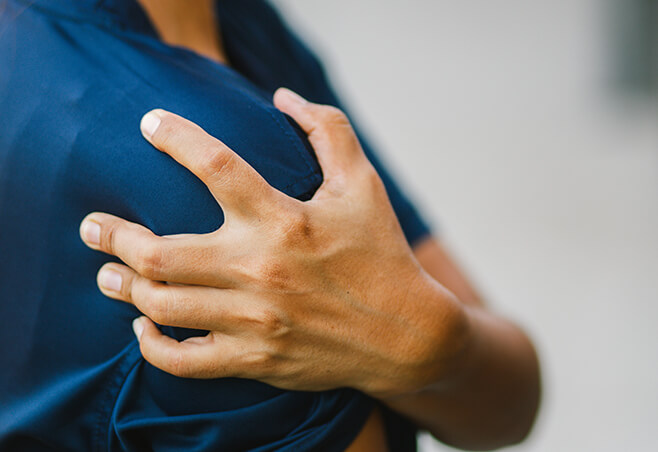
FAQs about rotator cuff injuries
Tears and sprains to the rotator cuff are common, especially in athletes and those who perform frequent overhead movements, but they’re also chronic and can become a source of stress and worry.
Below are some frequently asked questions to help you better understand how rotator cuffs can be injured and what you can do to get back to your normal routine.
Other shoulder conditions like tendonitis, bursitis or shoulder impingement can cause pain that’s like a torn rotator cuff. Shoulder arthritis, fluid build-up in the shoulder or a pinched nerve in the neck can also cause discomfort that’s similar to torn rotator cuff injury symptoms. Neck arthritis can also be felt in the shoulder region.
Pain should be your guide. If you’re experiencing persistent pain, weakness or difficulty using your shoulder, it’s a good idea to see a doctor. Getting an early evaluation helps prevent further damage and improves recovery.
Yes, more minor rotator cuff tears can be treated with conservative (nonsurgical) approaches like physical therapy, rest and anti-inflammatory medications. However, larger or complete rotator cuff tears might require surgery for best results and a torn rotator cuff cure.
If you have a torn rotator cuff and continue to use your shoulder, you risk worsening the tear, increased pain and possible long-term complications, so it’s best to get treatment sooner rather than later.
Rehabilitation is a must for a successful recovery, whether you’ve opted for rotator cuff surgery or not. Physical therapy will help restore strength, flexibility and range of motion, and it can prevent future rotator cuff injury from happening again.
Advances in minimally invasive surgery, including shoulder arthroscopic techniques, are leading the way in treating rotator cuff tears. For nonsurgical options, regenerative treatments are being explored.
Unfortunately, without proper treatment and intervention, pain from a torn rotator cuff will continue and can get worse over time. It’s essential to address a rotator cuff injury as soon as symptoms appear to prevent chronic discomfort and loss of shoulder function.
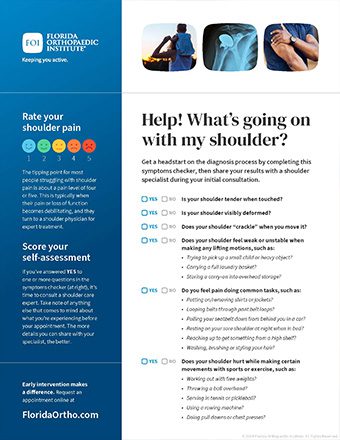
Help! What’s going on with my shoulder?
Videos
Related specialties
- AC Joint Injuries
- Atraumatic Shoulder Instability
- Bankart Repair
- Bicep Tenodesis
- Broken Collarbone
- Bursitis of the Shoulder (Subacromial Bursitis)
- Calcific Tendinitis of the Shoulder
- Clavicle Fractures
- Dislocated Shoulder
- Fractures of the Shoulder Blade (Scapula)
- Glenoid Labrum Tear
- Impingement Syndrome of the Shoulder
- Little League Shoulder
- Reverse Total Shoulder Replacement
- Rheumatoid Arthritis (RA) of the Shoulder
- Shoulder Arthritis
- Shoulder Arthroscopy
- Shoulder Injury: Pain in the Overhead Athlete
- Shoulder Replacement
- Shoulder Separations
- Shoulder Socket Fracture (Glenoid Fracture)
- SLAP Tears & Repairs
- Subacromial Decompression
- Trapezius Strain (Muscle Strain Of The Upper Back)
- Traumatic Shoulder Instability

